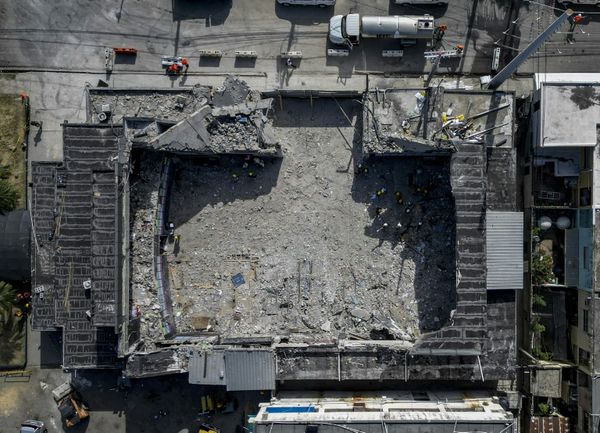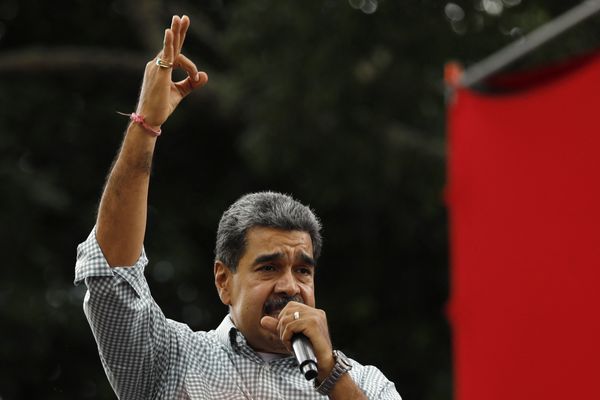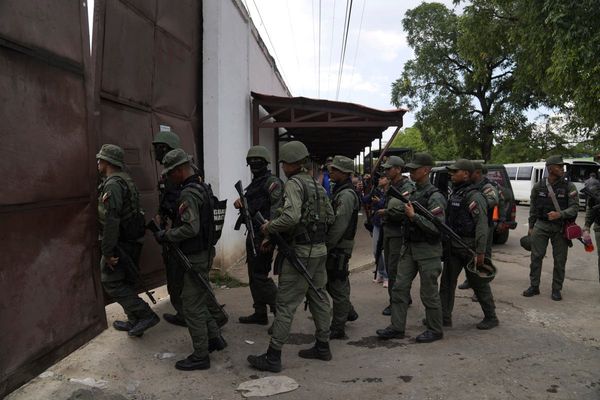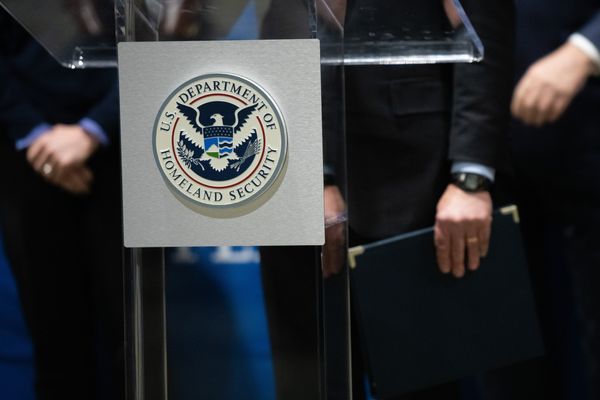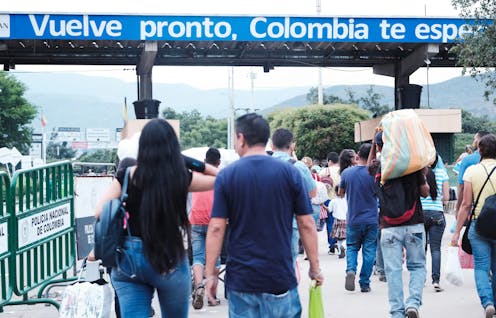
Venezuela’s disputed election results have thrown the country into chaos. The authoritarian leader of Venezuela, Nicolás Maduro, was declared the winner in a contested vote in July and, since then, has used state violence to inhibit any hint of protest.
The crackdown has led to the deaths of more than 20 people at the hands of Venezuela’s security services and pro-government armed groups known as colectivos, while more than 2,400 people have been thrown in jail. And the opposition candidate who is widely believed to have won the vote, Edmundo González, has fled to Spain after being threatened with arrest.
This swift escalation has sparked widespread concern throughout Latin America and beyond. Another wave of migration may be imminent, adding to the nearly 8 million people who have already left Venezuela since 2015. Countries across Latin America, especially Colombia, have expressed concern that a new surge of displaced Venezuelans might overwhelm public services and fuel political tensions.
It is possible that governments in the region may respond by imposing stricter border controls to stem the flow of migrants. But past experience shows that this move would both be ineffective and harmful.
Venezuela is a nation that was once known for its vast oil wealth. However, it has endured a prolonged period of economic and political instability. The country’s democratic backsliding began under former president Hugo Chávez in the early 2000s, but it worsened dramatically after he died in 2013 and Maduro came to power.
Maduro’s rule has been marked by rampant inflation, a 75% reduction in GDP, and widespread political repression. These conditions have led to one of the largest migrations in modern history. Nearly a quarter of Venezuela’s population have fled their homes, primarily to other South American countries.
Read more: Venezuelan migrants are boosting economic growth in South America, says research
Initially, many Latin American nations coordinated their response. Governments came together in Ecuador to sign the Quito Declaration in 2018, for example, which committed them to ensuring the safe and regular migration of Venezuelan citizens.
However, this cooperative spirit soon began to unravel. Chile, Ecuador and Peru made it much harder for ordinary Venezuelans to enter their countries legally by introducing visa restrictions by the middle of 2019. These restrictions replaced earlier policies that allowed entry to Ecuador and Peru with just an ID card.
The effectiveness of these restrictions has been the subject of much debate. In a recent study, I compared the experiences of countries that introduced restrictions with those of Argentina, Brazil and Uruguay, which kept their borders open.
My findings suggest that restricting migration in South America has not prevented it. Migration has instead been driven underground, with significant costs both for migrants and host countries.
The introduction of visa restrictions led to a 38% increase in the number of Venezuelan migrants who crossed borders via unauthorised routes, and a 41% rise in migrants without a regular residency permit in their destination country. The number of Venezuelan migrants who lacked legal status in their host country also jumped from less than one-in-five to more than half.
This shift towards irregularity has had consequences. For example, I found that falling into irregularity led to a shift in migrants’ priorities away from seeking employment and towards trying to regularise their migratory status.
There is also no evidence to suggest that migrants redirected their journeys to South American countries with more open policies. In fact, the composition of migrants remained largely unchanged after the introduction of restrictions.
Lessons from Europe
Before the election, a poll conducted by Venezuelan firm Meganálisis indicated that around 40% of Venezuelans would consider leaving the country if Maduro remained in power. This represents a potentially staggering increase in migration, even if we account for the gap between intention and action.
To avoid exacerbating an already critical situation, countries in the region must adopt pragmatic policies that prioritise safe and regular migration. And they should offer regular status to migrants that already reside there.
Europe’s response to the mass displacement caused by Russia’s invasion of Ukraine offers lessons that Latin American governments should not ignore.
In 2022, the EU coordinated efforts to allow Ukrainian refugees free and safe movement throughout Europe, while also guaranteeing their right to work and residency, as well as access to health and educational services.
Read more: Ukraine war: a year on, here’s what life has been like for refugees in the UK
Despite the massive scale of this displacement, at over 6 million refugees, there was no widely reported “Ukrainian refugee crisis” because of this cooperative approach.
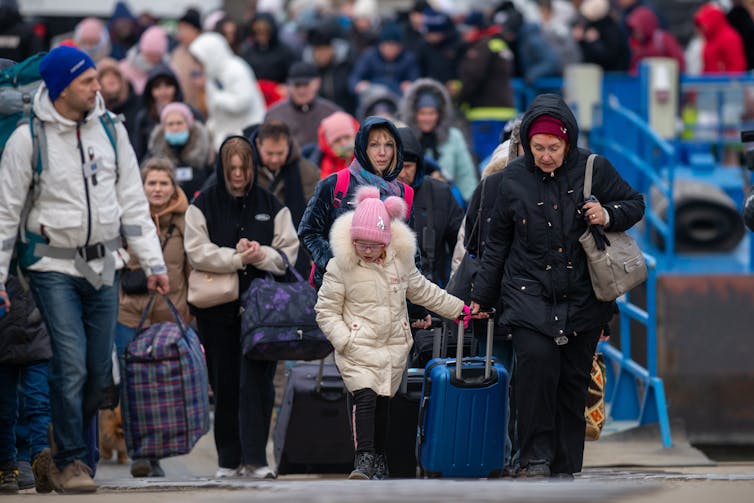
While the refugee status of Ukrainians in Europe is guaranteed up to February 2026 (and can be extended if the European Council agrees), the story is quite different for displaced Venezuelans. Despite being considered refugees by the UN and the laws of most Latin American countries, governments in the region have largely decided not to recognise them as such.
Nevertheless, Latin American governments should pursue a strategy similar to the one we have seen in Europe. This must include renewing their commitment to the principles outlined in the Quito Declaration, as well as establishing common standards across the region for the reception of Venezuelan migrants.
These standards should include the possibility of allowing Venezuelans to cross borders using only their ID cards, as is still the case in Argentina and Brazil, given how costly passports and other travel documents are for many Venezuelans.
Such requirements would significantly reduce the likelihood of irregular migration and, together with mass regularisation programmes, have a positive impact on the integration of Venezuelans into their host countries.
As Venezuela continues to grapple with political and economic collapse, the international community – and particularly neighbouring Latin American nations – must be prepared for another surge of migration.
But the response should not be to close borders or restrict access. Governments must instead coordinate to ensure safe, regular and humane migration routes.
The future of millions of Venezuelans, as well as the stability of Latin America, depends on the region’s ability to manage this crisis effectively.
Omar Hammoud Gallego has received funding from the UK Economic and Social Research Council to conduct this research.
This article was originally published on The Conversation. Read the original article.





